Highway extortion by security agents in Borno gulping millions yearly, affecting lives
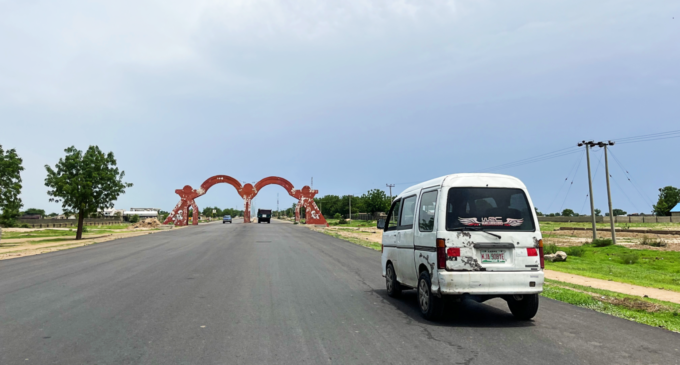
BY IJASINI IJANI
Driving from one town to another in the northeastern Nigerian state comes at a price. Asides risking their lives, road users are also frequently levied by security agents on the highways — and because of the Boko Haram insurgency, there are so many of them.
The whirring from a vulcaniser at the Bama motor park in Maiduguri, northeast Nigeria, could hardly be ignored. Passengers gradually filled the minibus, and at quarter past eight in the morning, we set out on the three-hour journey to Gwoza. I had asked the transport workers union officials to allow me to sit at the front of the vehicle, which gave me two advantages. One was being able to hear as the driver, 52-year-old Musa Gwoza, shared fact after fact about the history of Nigeria’s military rule. Second, seeing first-hand how people like him are routinely extorted by security personnel along the road.
Vehicles were first screened and numbered at the Alou checkpoint. About an hour later, we continued on the journey that Wednesday, March 29.
Between the park and the final stop in Gwoza, there were 34 security checkpoints: 27 manned by soldiers, two manned by officials of the Joint Task Force, two manned by vigilantes, two by police officers, and the last one by officials of the Nigeria Immigration Service (NIS).
At each of those checkpoints, the security personnel habitually collected ₦50 or ₦100 from the driver, more or less serving as his ticket to move from one point to the next. Only the vigilantes were not so entitled, but they also asked for money. Soldiers oftentimes collected more than their counterparts in the police force or other agencies. They would wave their hands as the vehicle approached, signalling to the driver to slow down and squeeze some money into their palms. It has become a silent agreement between the parties. Sometimes, drivers bring more than cash with them. They also give bread, groundnuts, and fara (fried grasshoppers) to the security agents.
Musa, the driver, has plied the Maiduguri-Gwoza road for more than 15 years and has supported two of his children to get university degrees from his earnings.
“Extortion by the security personnel has been a long-time ritual,” he complained. “Just that it got worse during the insurgency, especially after the closure of the road in 2015.”
Extortion of road users is a widespread problem in many parts of Nigeria, particularly on highways. Exploiting their positions of power, the corrupt security officials use intimidation and threats to get money from truck drivers, transport companies, and other travellers. They may demand payment for safe passage through certain areas, for permission to load or unload goods, or for protection from crime along the route. This is despite the fact that they are paid by the federal government to safeguard lives and properties.
Violence broke out in northeastern Nigeria in 2009 with the rise of Boko Haram, a terror group whose attacks have since led to the death of tens of thousands of people and the displacement of over two million.
The activity of the armed group along major roads in the region led to the establishment of prominent checkpoints with the hope of protecting civilians and preventing the insurgents from moving freely from one place to another. These checkpoints later created an opportunity for security personnel to extort road users.
Corruption in Nigeria’s security sector has existed for decades. A 2019 survey by Afrobarometer found that the police were considered the most corrupt public officials in the country, and two in five Nigerians thought the government was doing a bad job in tackling the problem. Much of the problem can be seen on roads across the country where police officers are stationed to prevent crime.
HumAngle gathered from interviews with multiple drivers and stakeholders in Borno that highway extortions by various security agencies often lead to delays, increased costs of fares and goods, and reduced efficiency in the transport system. Drivers are left with no option but to increase the transport fare so they can still make a reasonable profit, therefore passing the burden down to passengers. The practice can also lead to decreased safety on the roads as drivers are pushed to take risks or engage in dangerous behaviour in order to avoid paying illegal fees.
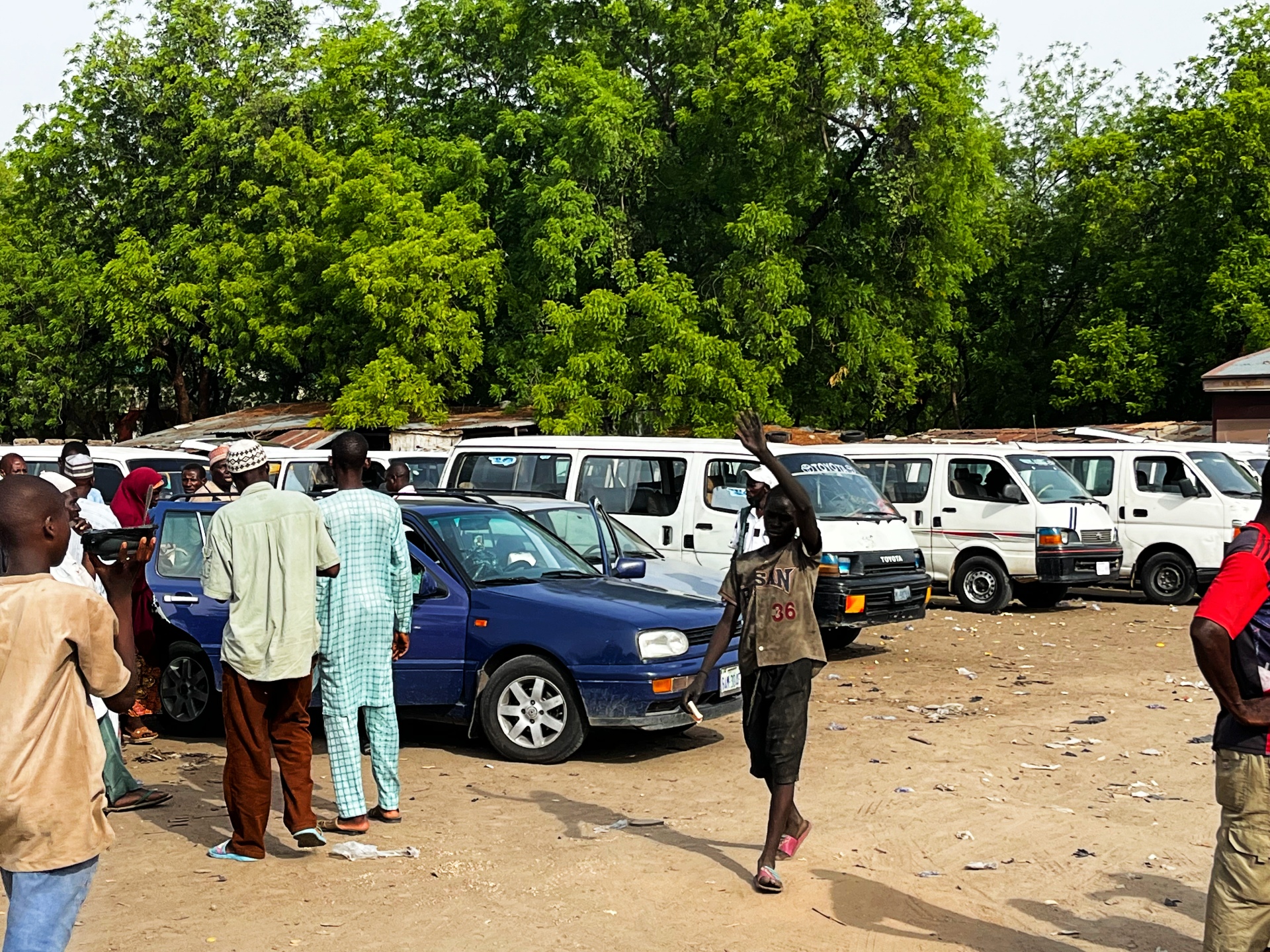
Drivers and passengers at the Bama Motor Park in Maiduguri, Nigeria. Photo: Ijasini Ijani/HumAngle.
CHECKPOINT ROBBERY
Samaila Usman, 43, says he gives at least ₦1,200 every day to security personnel as he drives from Bama Park to Gwoza and back. There are 15 to 16 major checkpoints on the route where drivers believe they are mandated to give the ‘what do you have for the boys’ money.
“I always give the cash when crossing through each checkpoint just to avoid being delayed, even though I’m not pleased with it. But I won’t delay my passengers just because of ₦50 or ₦100. I will just charge my passengers additional costs to meet up with the checkpoint demands along the road.”
Samaila sometimes gets away with only giving the soldiers sachet water or not even paying at all because of the rapport he has built with them over a long period. But when a new set of soldiers are deployed to a checkpoint, he would be left with no choice but to stick to the ritual.
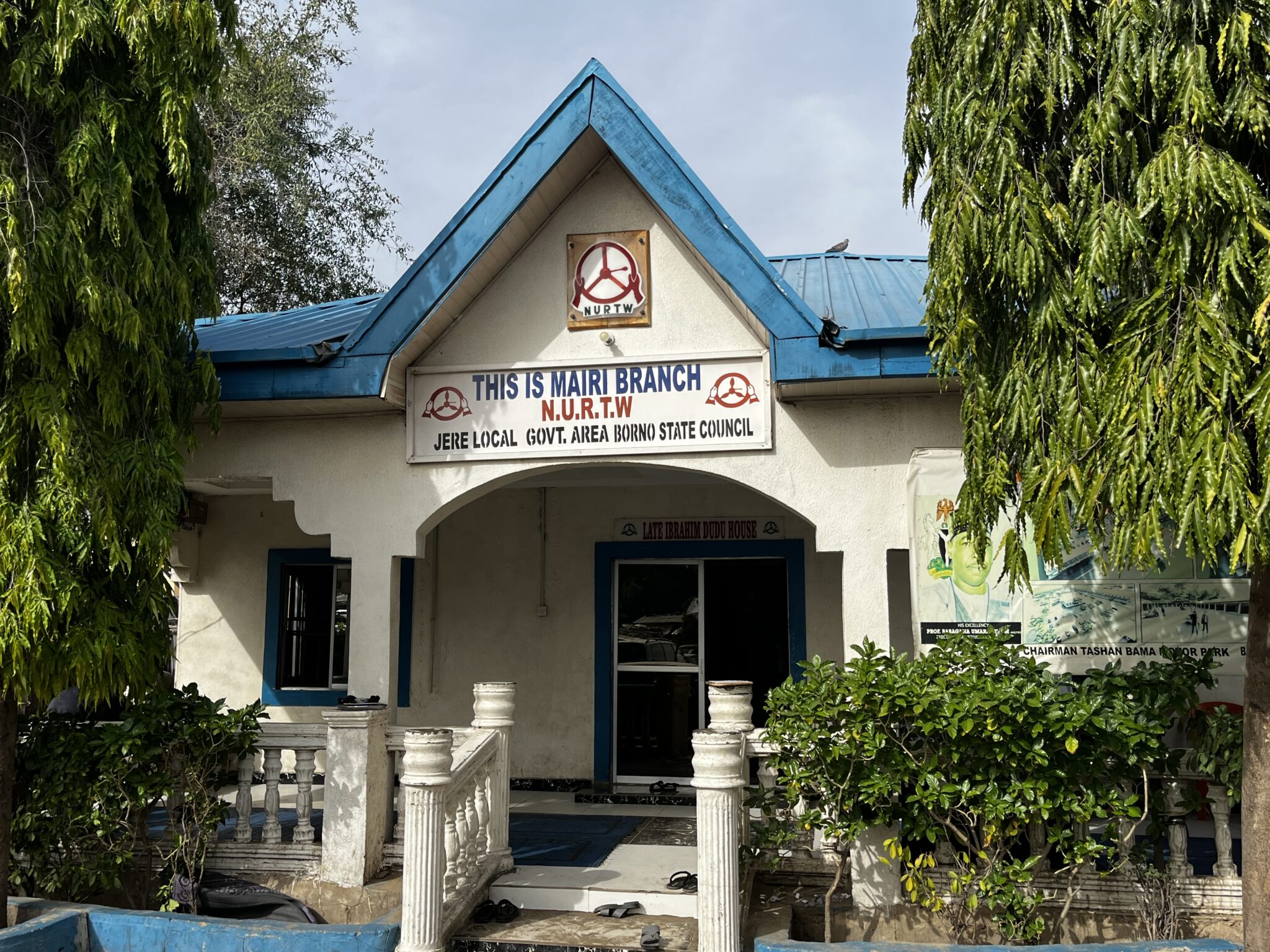
Tashan Bama Office of the National Union of Road Transport Workers (NURTW), Mairi Branch. Photo: Ijasini Ijani/HumAngle.
Taxi drivers at the Bama motor park in Maiduguri, known locally as Tashan Bama, convey passengers to Gwoza through Konduga and Bama. People also board vehicles going to Mubi and Yola, cities in the neighbouring Adamawa state, at the park. Drivers plied the major roads in Borno with ease before the insurgency escalated in 2010.
In Sept. 2014, the park was closed because of Boko Haram activities along the Maiduguri-Gwoza road, a strategic route that leads to the Far North region of Cameroon. The Nigerian military also stopped movements on the road. Because of the closure, the travelling distance between Maiduguri and Gwoza quadrupled from 127 km to 485 km as drivers were forced to move through Damaturu in Yobe state, Biu in Borno, Mubi in Adamawa, before finally arriving in Gwoza. This other network has much fewer checkpoints, and people who ply them have no fear of being attacked or extorted by security personnel.
Over three years after the closure, the military reopened the Maiduguri-Bama highway in March 2018, lifting the spirits of businessmen and travellers, including people who had not visited their home communities in a long time. “We implore the commercial road users to kindly abide by the code of conduct that we have given them so that we can ply the road with some level of safety,” said Major General Nicholas Roger, Theatre Commander of the counterinsurgency military operations in the Northeast.
The reopening made travelling easier, but it also came with the many checkpoints that have been abused by security personnel.
“The police, road safety corps, NDLEA, immigration officers, and the Nigerian Army all collect cash from us,” said Ismail Buba, a truck driver who conveys goods from Maiduguri-Banki down to Gwoza town.
“They make it look like it is obligatory to give the abnormal ₦50 or ₦100 at each checkpoint. Sometimes, they make it look like they are doing us a favour by collecting money from us. We don’t refuse because it serves as our ticket to the next checkpoint towards our destination.”
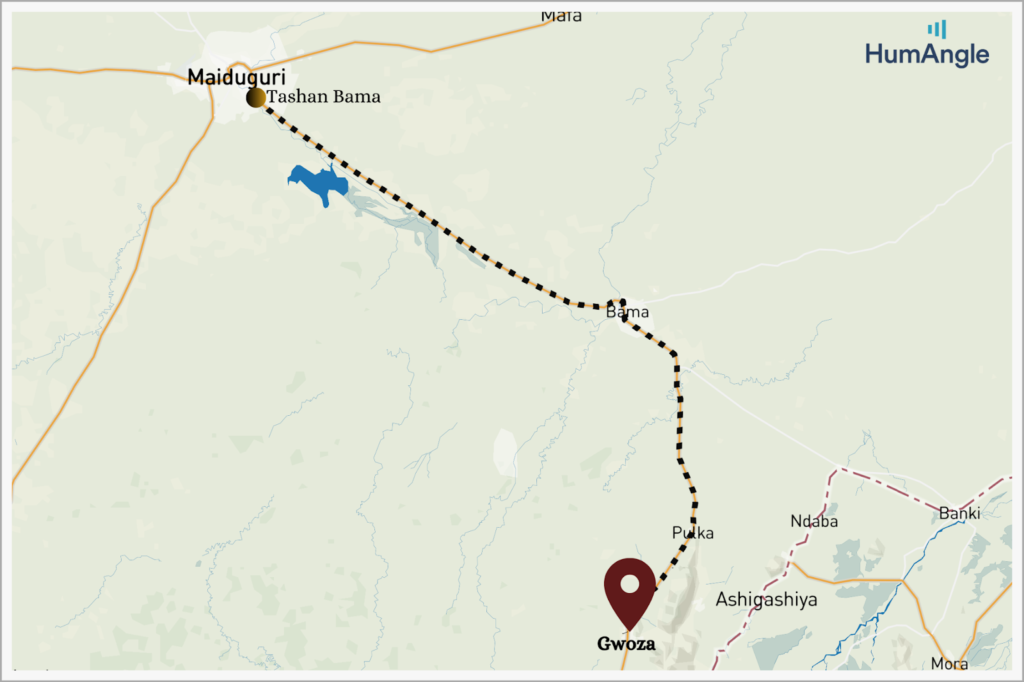
Map illustration: The 127 km route from Maiduguri to Gwoza/Mansir Muhammed/HumAngle
Extortion is not only a daily routine on the Maiduguri-Gwoza road. The practice is common along many other major roads in Borno state, and we observed the same trend along the Maiduguri-Mafa road, Maiduguri-Gubio road, and Maiduguri-Monguno road.
HumAngle noted that there are about 18 checkpoints between Muna Park in Maiduguri and Mafa town: 14 manned by the Nigerian Army, two by the police, one by the road safety corps, and one by customs officers. Drivers regularly smuggle goods, such as rice, cement bags and petrol, out of Nigeria through the Ngala border area using this route.
The first checkpoint after the Maiduguri city gate is guarded by FRSC officials, who often receive bribes from drivers without licences. At the next one, which had police personnel, our driver gave ₦50 to the officer, who immediately tucked it in his combat wear.
“The road to Mafa is our daily route,” said Fannami Abor, who has been plying the road for over five years. “I travel to and fro twice a day along this road. I always give money whenever I load goods, but when it is just the passengers, I only give to a few checkpoints that I know I can’t escape.”
He claimed that all the checkpoints along the Mafa road collect money from all commercial vehicles all the time when they have goods with them. Soldiers receive more money and customs officers are only given bribes when the drivers are smuggling rice across the border.
By the end of the journey, the driver had given out ₦50 at 13 checkpoints and managed to sweet-talk his way out of paying at five others. This sums up to ₦650.
Usman Dibal, 41, a commercial driver also plying the Maiduguri-Mafa road down to Dikwa, told HumAngle this practice doesn’t sit right with him.
“I have never given this money willingly. I have no option but to pass through the checkpoints, and that is the one reason I am giving the normal ritual. I always charge security officials who board my taxi along the route because they also extort from us the drivers, and so they must pay me fully without any leniency,” he lamented.
Truck drivers are charged even more on the road. Abba Pele, who drives one, said he has to pay ₦500 per checkpoint every time he is transporting cargo between Maiduguri and Dikwa, and this applies to about 16 of them.
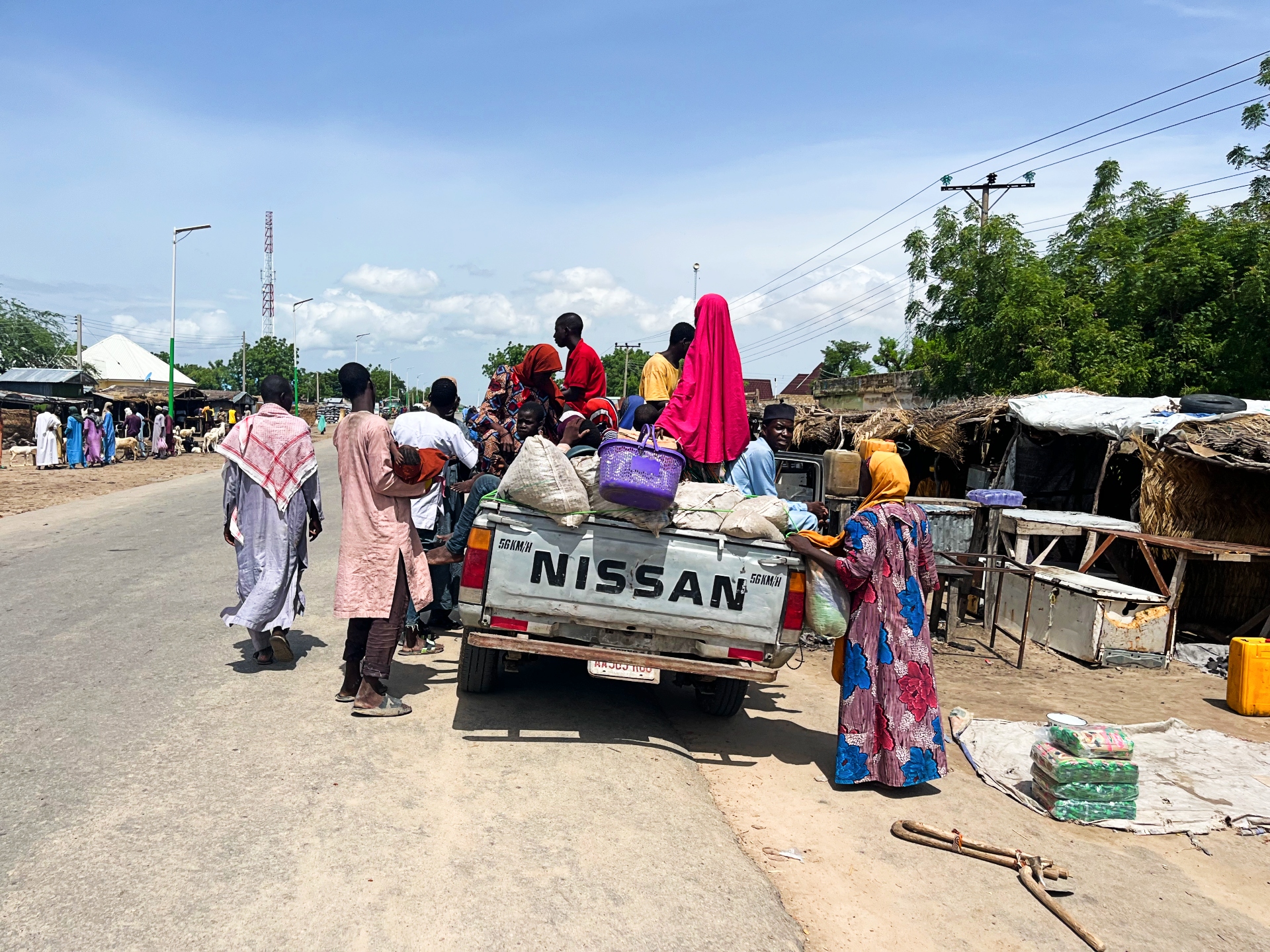
A Nissan 1988 model loaded with farmers in Mafa. Photo: Ijasini Ijani/HumAngle
Let’s take a look at the Maiduguri-Gubio road too. It has about 25 checkpoints: 15 manned by soldiers, three by police officers, two by CJTF, one by the FRSC, one by Customs, one by the NSCDC, one by NIS, and the last one by the NDLEA. But extortion rates are lower compared to the other major roads. This is likely due to the reduced traffic here because of frequent terror attacks – especially during the rainy season.
“I have been stopped several times along the Magumeri to Gubio road by the armed group, mostly during the raining season,” said Mallam Bukartima. “The soldiers are extorting the little we have gotten and whenever the armed group stops us, they also extort from us, taking away our phones, money and goods with them.”
About nine of the security checkpoints on the road extort drivers, seven of those having Nigerian Army personnel and the other two manned by NDLEA and NIS officers.
Ali Gubio, 32, says he gives ₦450 every day as bribes along the road.
“₦50 Naira to five checkpoints of the soldiers, ₦50 to the Immigration officer, ₦100 to the police officers at the Magumeri checkpoint, and ₦50 to the NSCDC agents at the Maiduguri city gate.”
Most of the vehicles on the route are owned by non-governmental organisations that have security agents attached to them. They have a pass to convey goods to their destinations, often including Magumeri, Gubio, and Damasak.
NURTW officials at the Gubio Park told HumAngle that between 25 and 35 commercial vehicles pass through the route daily. This number goes up on some days, especially during food distribution exercises at displacement camps.
The Maiduguri-Monguno road is another notorious route, starting from Baga Park and winding up at the entrance gate in Monguno. The Baga River and Lake Chad province along the road have attracted armed groups over the years. There are 22 checkpoints here: 18 manned by soldiers, two by the police, one by the NDLEA, and one by Customs.
Soldiers often extort truck drivers, collecting nothing less than ₦300 per loaded truck.
Sheriff Isah, who drives a truck, says he gives ₦500 per checkpoint from Gajiganna up to Nganze. There are about five of them between those places. Then he gives ₦200 per checkpoint to the remaining 12 up to Monguno. “They only collect money from me when I am carrying goods in my truck,” he said. “We have at least 10 trucks plying this route every day with goods.”
Mallam BK, a commercial driver, also confirmed that he gives ₦50 at most of the checkpoints starting from the one in Maimalari down to Monguno town, costing him at least ₦500 to ₦600 daily.
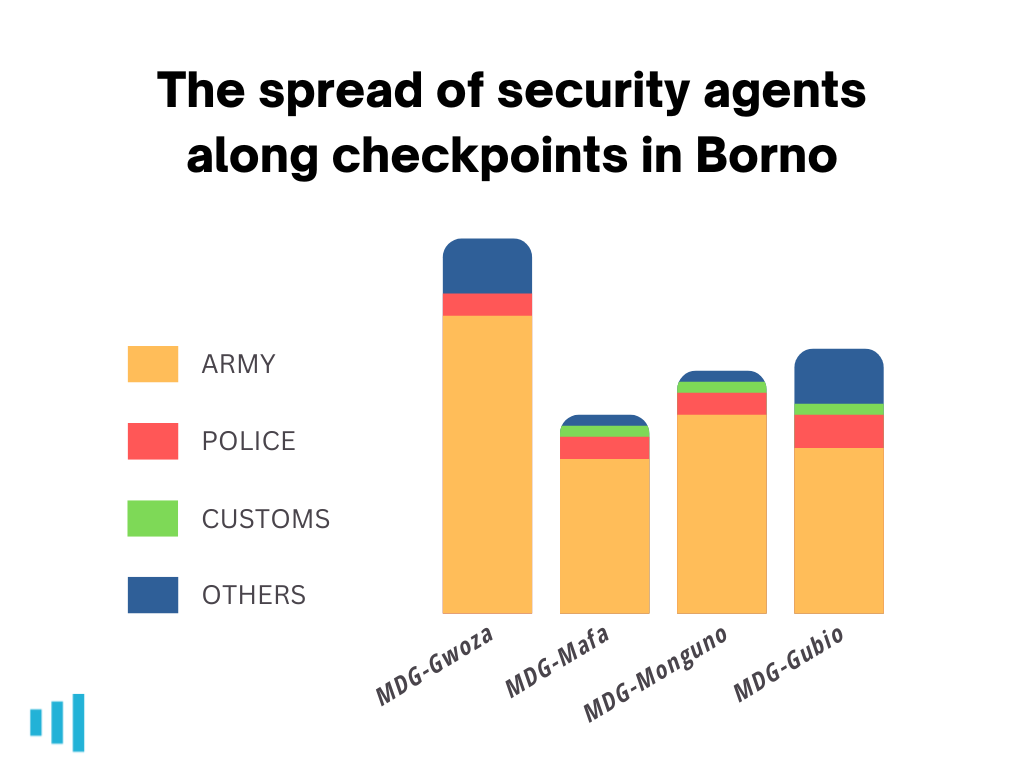
Infographic by: ‘Kunle Adebajo/HumAngle
BUSINESSMEN, IDPS BEAR THE BRUNT
As much as the practice has affected drivers, they are not the only victims. People conducting businesses who need to move their commodities between locations have their grievances too.
“I don’t travel with plenty of goods anymore,” said merchant Felicia Philemon.
“The drivers complain that the security personnel always charge them more than the normal fee ₦50 or ₦100 at most of the checkpoints [because of the extra cargo]. I prefer to board a car that has no goods and chattels loaded so as to avoid heavy checking along the road. This has affected my little business in Gwoza town. I need to split my goods into different vehicles and need to pay more to make sure my goods reach my destination.”
Also, many of the passengers moving around these towns are internally displaced people from Bama, Banki, Pulka, and Gwoza who are trying to get by. The higher the illegal fees drivers pay on the road, the more they would, in turn, charge the passengers, many of whom are struggling to survive.
“The extortion of money from us drivers was what hiked the transport fare from the normal ₦1,500 to ₦2,000 per passenger when travelling from Maiduguri to Gwoza,” observed Musa Dauda, 32, a taxi driver.
HumAngle learnt that in Pulka, officers at the NIS checkpoint are notorious for asking to see the travellers’ national identity cards. Those without one are then told to pay ₦200, after which they are allowed to pass. Foreigners without the local ID card are sometimes extorted as well, and this has been going on since 2018.
Maryam Madube, a 21-year-old IDP from Gwoza, told HumAngle she had to pay this amount at the NIS checkpoint anytime she travelled from Maiduguri to Gwoza after she lost her identity card.
“It doesn’t matter how much I explained to them. Nothing helped until I paid,” she said angrily.
“This happened to me for almost a year before I was able to retrieve my national identification number. This is daylight pocketing by those that need to protect us after knowing how insecurity has affected our livelihood, but they still extract from the little we have for our survival.”
The state government has confirmed that these incidents happen. In Jan. 2020, the governor, Babagana Zulum, accused police officers and soldiers of collecting bribes from travellers without national identity cards along the Maiduguri-Damaturu highway, describing it as unacceptable.
“How can you subject people to this kind of torture all in the name of National ID card? And you are all here collecting ₦500 and ₦1,000 from poor travellers who don’t have national ID cards,” he said.
Borno is the state hardest hit by the humanitarian crisis that has trailed the Boko Haram insurgency. Of the 2.4 million internally displaced people documented in the Northeast as of March, about 77 per cent were in Borno state. About 8.3 million people need humanitarian assistance in the region. In Borno alone, 1.9 million people are estimated to need food support between June and September, and 65 per cent of households surveyed by the United Nations experienced crisis levels of hunger.
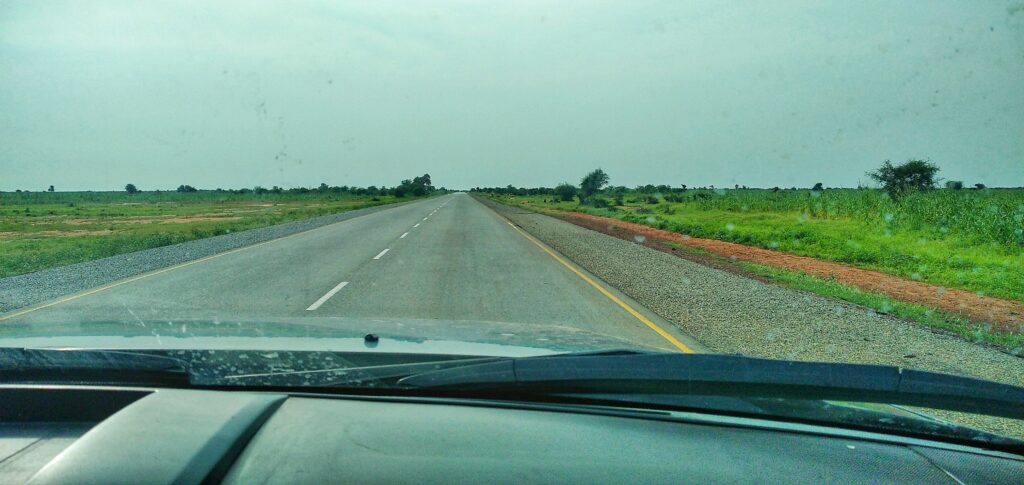
Dashboard view of the Bama-Pulka road, Borno state. Photo: HumAngle.
Meanwhile, many drivers have gotten used to the tradition of parting with some money at these stops. Adamu Adamu, a taxi driver who constantly gives ₦100 at each of the eight checkpoints between Bama and Gwoza, says he doesn’t see anything wrong with giving “the normal” fee.
“The security agents are responsible for our protection along the road,” he explained. “Without their protection, both the commuters and we, the drivers, can’t use the road.”
MILLIONS EVERY YEAR
According to Bamai Mustapha, chairman of the NURTW branch in Mairi, 50 to 70 commercial vehicles depart from the Bama motor park in Maiduguri every day, and “each driver gives nothing less than ₦500 from the Kawuri checkpoint down to the last checkpoint in Gwoza”.
One driver along the route, who asked to be anonymous, confirmed this estimate.
“I give ₦50 habitually at most of the checkpoints because I don’t carry overloaded goods from travellers. It always costs me ₦500 per trip from Maiduguri to Gwoza and another ₦500 when travelling back.”
The implication of this is that at least ₦25,000 is extorted from 50 drivers every day along the Maiduguri-Gwoza road, summing up to at least ₦9.1 million annually. Since the practice has been ongoing for over five years, we can estimate that over ₦45.5 million has been illegally collected from drivers by security agents on this route alone since it was reopened in 2018.
A similar calculation for other routes shows that millions are extorted yearly from each one.
HumAngle gathered from an NURTW official at Muna Park that vehicles leaving for Mafa from Maiduguri daily include about 40 Volkswagen Golf cars, 25 Nissan Desert Runner 1988 model cars, and 15 trucks.
An estimated amount of ₦42,250 is extorted from 65 drivers using smaller vehicles every day, while at least ₦120,000 is extorted from 15 truck drivers, both totalling about ₦59.2 million annually.
For the Maiduguri-Monguno road, NURTW official Isa Nganze said over 40 vehicles depart from Baga Park every day, excluding trucks. An estimated sum of ₦24,000 is extorted from the vehicles daily, plus ₦49,000 extorted from 10 truck drivers, which totals about ₦26.6 million yearly. Nganze says it used to be considerably worse.
Along the Maiduguri-Gubio road, about ₦15,750 is extorted from 35 drivers daily, running into about ₦5.7 million annually.
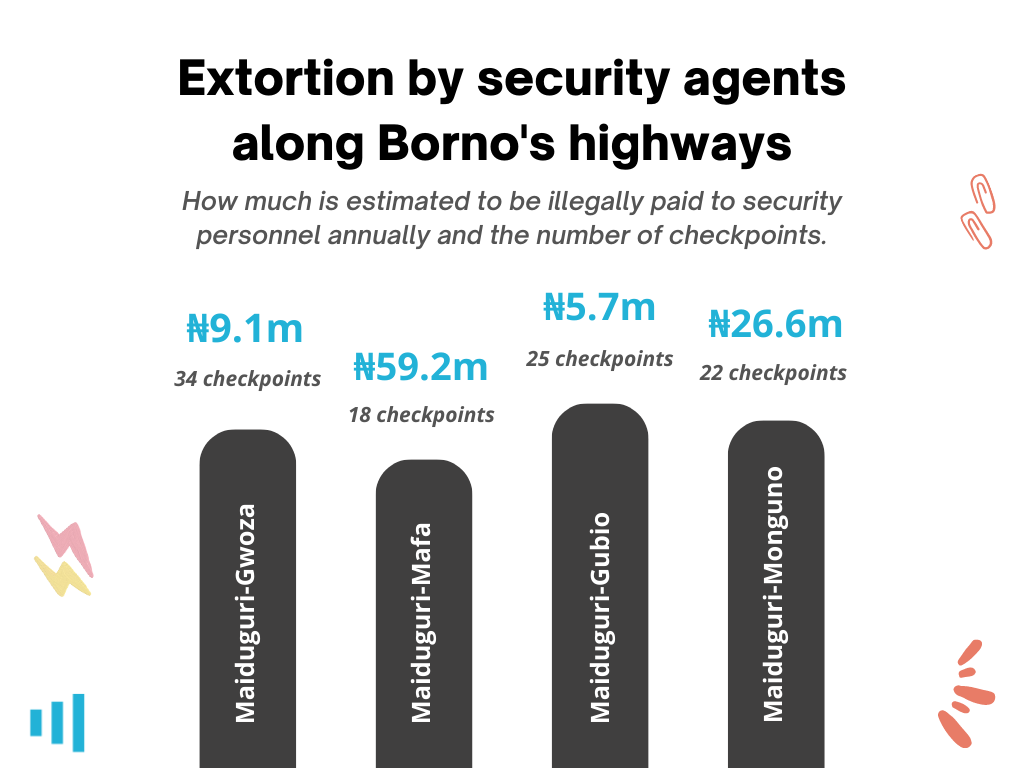
Infographic by: ‘Kunle Adebajo/HumAngle
HumAngle reached out to the various security agencies whose officials have been sighted at these checkpoints.
Deputy public relations officer for Borno state police command, ASP Nahum Daso Kenneth, replied that the force is not a revenue-generating organisation and the officers’ actions are not “in conformity with the Police’ structural operation procedures and its mandate”.
“No police officer is posted on the road to collect money or extort money. The Police authority will deal with any officer found wanting,” he assured. “Majority of Gwoza people are very vulnerable and with less privilege. They feed from hand to mouth. They deserve special attention and treatment to reintegrate into a livelihood and not to be extorted.”
At first, spokesperson of the state NSCDC command Bulus James said the agency does not man checkpoints at the Maiduguri-Gwoza route. When we provided information on the exact location of the personnel, he replied that he was hearing about the development for the first time. He suggested contacting the divisional officer for Bama, CSC Abdulmalik, who did not respond to our enquiries.
Spokespersons of the Nigerian Army, NIS, and NDLEA did not answer calls from HumAngle and have not replied to texts sent to their phones.
Budget allocations for defence and security increased significantly under the Muhammadu Buhari-led administration, which handed over power in May. The country budgeted ₦1.4 trillion ($3 billion) for defence in 2023, a 135 per cent increase compared to the 2019 budget. The policing budget has similarly increased, with a lot of the money going into salaries and recurrent expenditures.
So why do officers still engage in corrupt practices? James Barnett, a conflict expert and research fellow at Hudson Institute based in Lagos, says some of it can be blamed on the war economy that has emerged because of the protracted conflict.
“When a soldier sees the guy above him taking part in some form of corruption or extortion in a significant manner, he’s liable to want to get in on the action as well and believe that it is an acceptable part of the institutional culture,” he explained.
“Relatedly, many soldiers complain that they don’t get paid on time or in full, or that the supplies and equipment they receive is inadequate or non-functional—both downstream effects of institutionalised corruption—although these complaints seem to have decreased somewhat in recent years compared to at the peak of the insurgency. Anytime soldiers are not receiving what they need, they are liable to use the power of their status and their gun to forcefully make up for that, even if it means extorting innocent civilians.”
There have been repeated complaints from police officers serving in the Northeast about unpaid allowances and poor welfare conditions. In July 2018, officers blocked a Maiduguri highway in protest. “For over six months now, we have no allowances, no decent accommodation; we sleep on corridors of officers and sometimes in the open air,” one of them told Premium Times.
The solution, according to Vincent Foucher, a researcher with the French National Centre for Science Research who specialises in Islamist extremism, is to sanction the offenders.
“Nigeria has an old history of civil war and military dictatorship, and a number of persons in the security forces seem to have a sense of impunity. Many cases of abuse, be it corruption or violent abuses, including at senior ranks, have led to little or no investigations and punishments. This authorises misbehaviour,” he observed.
“The visible, legal and public punishment of corruption and abuse, all the way from the top to the bottom, is essential to bring about change. There are military courts, which is good, but there is next to no information about the cases and the decisions taken. This does not help.”
DELAYS, SECURITY RISKS
There are 15 to 20 heavy checkpoints and over 15 subtle checkpoints between Maiduguri and Gwoza. It starts with the first checkpoint at Kawuri village, where all commercial and private vehicles are screened before they are allowed to proceed to Konduga. The final checkpoint is a few kilometres from Tashan Mararaba in Gwoza town.
Each checkpoint has some security personnel attached to it, ranging from officers of the Federal Road Safety Corps (FRSC), National Drug Law Enforcement Agency (NDLEA), Nigerian Army, Nigeria Immigration Service (NIS), Nigeria Police, and Nigeria Security and Civil Defence Corps (NSCDC).
Passing through the checkpoints appears hassle-free once the fee is paid to the officers. If a driver does not cooperate, the trip can easily become frustrating. The car would be checked thoroughly and each passenger would be searched. Everyone could be delayed for hours before they are passed to continue their journey.
Musa was a victim of this. Once, he was delayed for two hours in Bama by officers of the Nigeria Police and the FRSC after refusing to give them ₦100. “I had to sleep over in Bama and couldn’t get to Pulka before they closed the gate, making a trip of one day to last two days,” he recalled. Since then, he has cooperated with the security personnel.
Observers believe the corrupt practice encourages security agents to abandon their duties as they tend to pay lesser attention to vehicles that offer them bribes. This gives travellers room to smuggle illegal goods and could give insurgents opportunities to move arms and explosives along the routes.
“I don’t hesitate to follow the normal tradition of giving cash to the security personnel because no matter how encumbered your vehicle is, they will never search the carriage or delay your movement once you give them that normal doings at the checkpoints,” Musa said.
Transparency International observes that one way Boko Haram has gotten the support of locals is by pointing out violations by security forces “as proof that only a constitution based on a strict interpretation of Islam could guarantee a just and fair society”.
Rampant corruption, the group said in a 2021 report, “has weakened defence and security forces, fuelled resentment against states’ representatives and enabled non-state armed actors to fill the vacuum”. It noted that some of the least peaceful countries in the world are also ranked very low on the corruption perception index.
Barnett agrees with this assessment.
“Corruption and extortion undermine the armed forces’ efforts to build trust with the communities that they need to be winning the support of if they hope to deliver sustainable gains against the insurgents,” he explained.
“Counterinsurgency is largely a contest of governance, and the insurgents, particularly ISWAP [Islamic State West Africa Province], thrive on exploiting the grievances of vulnerable individuals and communities.”
Barnett believes corruption creates opportunities that insurgents can exploit, such as bribing their way through checkpoints to purchase supplies and conduct attacks. The trend could also “create a system of skewed incentives” that discourages soldiers from actively engaging the terrorists since it comes with far more risks and fewer rewards.
Foucher similarly states that when people perceive security personnel as corrupt, it weakens their legitimacy. This complicates military operations and “can create tensions within the security forces themselves”.
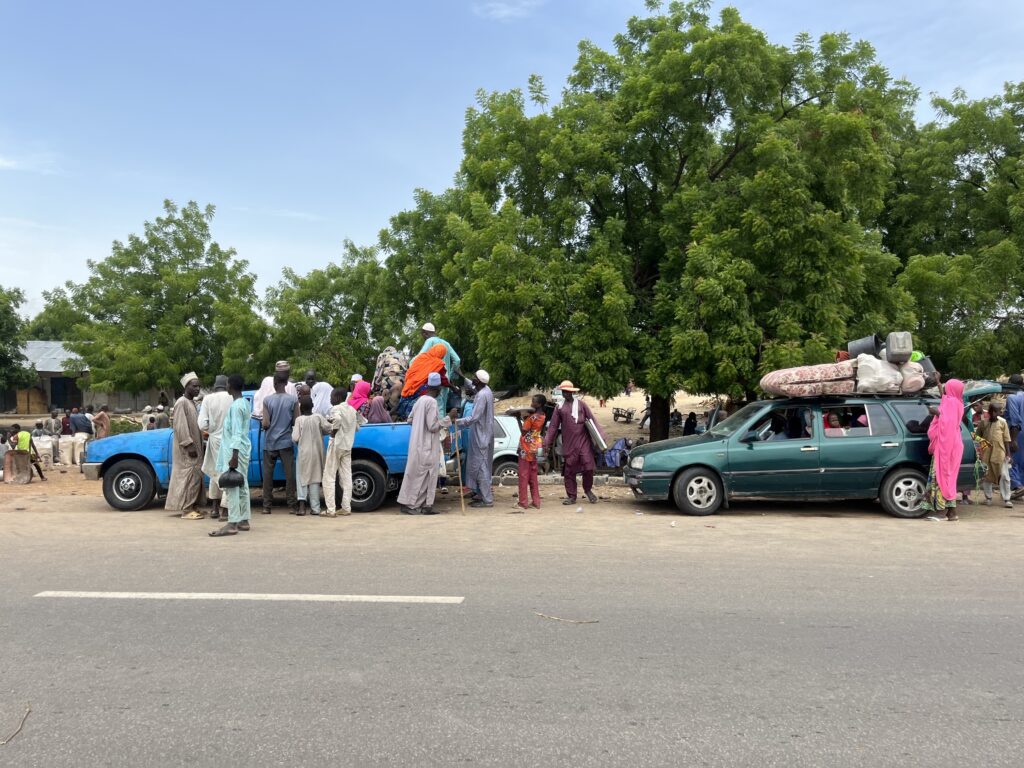
Passengers boarding at the Muna Motor Park Maiduguri to Mafa. Photo: Ijasini Ijani/HumAngle.
A GALAXY OF CORRUPTION
Extortion along the roads in Borno wasn’t always this widespread. Adamu Mustapha, 31, said he did not have to pay to transport goods worth over ₦1 million from Maiduguri to Mafa, Dikwa, and Gamboru Ngala before the insurgency.
“But transporting food supplies to Mafa is hectic now. You need to pass 15 checkpoints, all manned by the soldiers, and you must give nothing less than ₦300 per checkpoint. For my goods to reach Mafa local government area successfully, I always keep ₦10,000 per truck and ₦4,500 per small vehicle.”
He explains that the extortionary practice has triggered a spike in the price of goods in Mafa, Dikwa, and Gamboru Ngala.
“Many of my friends have withdrawn from this business because of how security personnel have made the route unfavourable,” he added bitterly. “I am still into this business because of my people. I know how they are suffering with getting some basic goods in Mafa. I have no choice but to help out by bringing in the needed goods for their consumption.”
The level of corruption sometimes goes beyond paltry payments. This was the experience of Alhaji Garba Ali, 45, who has moved fish between Monguno and Maiduguri for over 20 years. His father introduced him to the business when he was still enrolled in secondary school. The fish business brought impressive profits before the Boko Haram crisis. Traders came all the way from southern Nigeria to buy fish from the Monguno market. But that is no longer the case.
Military personnel also took advantage of the restrictions on movement to make a killing from the business.
“The soldiers along this route stopped us from transporting the fish to Maiduguri, and the fishing business became dominated by the Nigerian Army officials,” Garba recalled.
“I myself have bought fish from a sergeant in Monguno for more than ₦10 million. Over ₦1 million has been extorted from me for my fish to reach Maiduguri during the peak of the insurgency.”
According to fish trader Zakariah Ngubdo, after transporting fish from Monguno to Maiduguri was disallowed, businessmen had to bribe security personnel ₦1,500 per carton of fish. This meant suppliers had to raise the price from between ₦2,500 and ₦4,500 to ₦6,000 when selling to local traders, who then resold them for about ₦9,500.
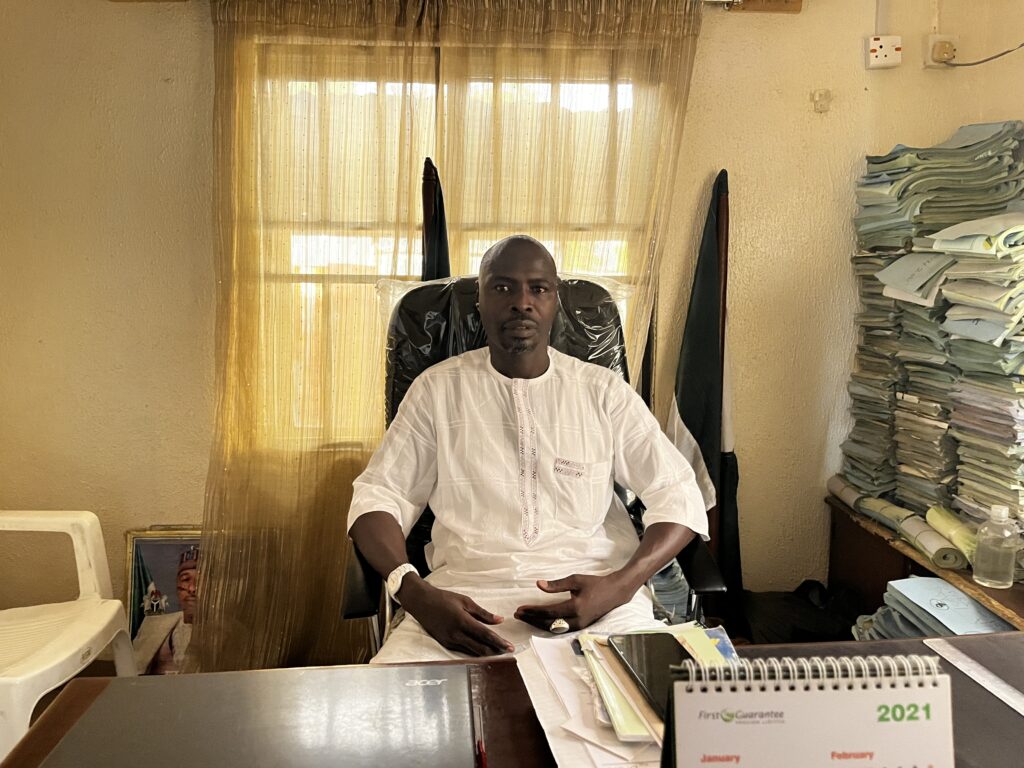
Bamai Mustapha, NURTW chairman, Mairi branch. Photo: Ijasini Ijani/HumAngle.
Before he became a top official of the NURTW, Bamai was also a driver along the Maiduguri-Gwoza route. He drove passengers to Yola as well, and he saw first-hand the challenges on the road. But he says the situation has improved. The roads are in better shape and there is more security, developments that have significantly shortened the travelling time.
“We have been suffering along this route for over a long period of time, but now the situation is very favourable to our drivers and commuters. Three years back, the security personnel used to open the road linking Maiduguri to Bama at about 9 a.m. daily and closed it at about 4 p.m. But now they open the road by 7 a.m. and close it by 6 p.m.,” he observed.
Also, there are officials of several security agencies now supporting the Nigerian Army to protect travellers.
While he acknowledged that drivers give money to these officers, he insisted that they do so voluntarily. “Many drivers do give money along this road by their wish and not compulsorily,” he said. “We feel this is the only way to support the security personnel along the way, even though we know giving money to them is totally wrong and unacceptable.”
This report was produced in partnership with the MacArthur Foundation under the ‘Promoting Transparency in Insurgency-Related Funding in Northeast Nigeria’ Project.








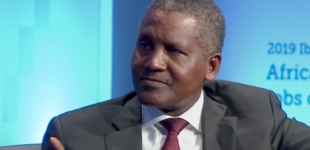
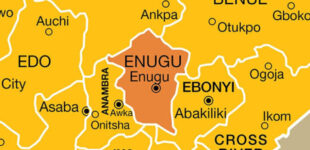




There are no comments at the moment, do you want to add one?
Write a comment